
I would rank Richard Rush’s The Stunt Man (1980) as containing Peter O’Toole’s second best performance. Peter Medak’s The Ruling Class (1972) — which is running on Jan. 14 — has had my vote for his best for over 40 years, and seems unlikely to change. But The Stunt Man is definitely something special. The film has never really gotten its due. I blame this on its title, which is at once perfectly apt but suggests something very different about the film it adorns. Yes, the movie is about a stunt man, but it’s really about a Vietnam veteran (Steve Railsback) on the run from the law (for reasons we only discover late in the film) posing as a stunt man. (“You shall be a stunt man who is an actor who is a character in a movie who is an enemy soldier. Who’ll look for you amongst all those?”) He takes on this role at the urging of a possibly dangerously eccentic and charismatic director (O’Toole), who the stunt man isn’t at all sure isn’t out to kill him. Beyond that, it’s about the nature of the movies, our collective paranoia and the line between truth and illusion. It was a movie guaranteed to alienate audiences expecting another Hooper (1978) or Evel Knievel (1971). Similarly, it was likely to put off viewers fearful that it might be another Hooper or Evel Knievel.
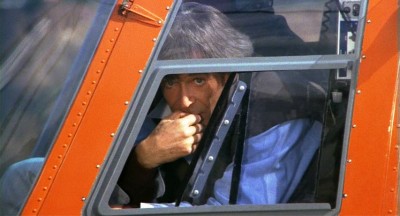
I first saw the film in 1980 at one of those awful shoebox theaters — this one being in Lake Wales, Fla. That The Stunt Man even played in Lake Waless strikes me as remarkable — or the result of a misunderstanding on the part of a booker. Certainly, the audience I saw it with weren’t expecting what they got. Not to put to fine a point on it, but I was seated near a group of the finest specimens of the Americanus Napus Rosa that Lake Wales had to offer (and Lake Wales had its fair share of weedbenders from which to choose). They spent the greater part of the film debating what a “gook” was. I would not call this conducive to the full appreciation of the movie, but really, it was so hard to take your eyes off O’Toole’s performance — and, for that matter, Railsback’s interactions with him — that it was impossible to wholly destroy the mood.
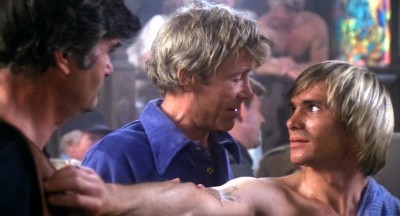
The complexity of The Stunt Man is hard to overstate. Oh, you don’t have to “get” its every level of meaning in order to understand or enjoy the film — there are layers upon layers to explore. But the deeper you go, the more you uncover. The relationship between Cameron (Railsback) and Eli Cross (O’Toole) is fraught with subtext of all kinds. Some of it is hardly subtext. At one point Cameron remarks, “I can’t figure it out. I can’t take my eyes off the son of a bitch. It’s like I feel like thanking him ‘cause I fell on my ass,” only to have the stunt coordinator (Charles Bail) tell him, “It’s just a crush.” Judging by the way Cameron looks at Eli, it’s at least that. Moreover, when Cameron becomes romantically involved with leading lady Nina (Barbara Hershey) and finds out that she’d once slept with Eli, it’s never entirely clear just which of them — Nina or Eli — he feels more betrayed by. (I’d say it’s about even.)
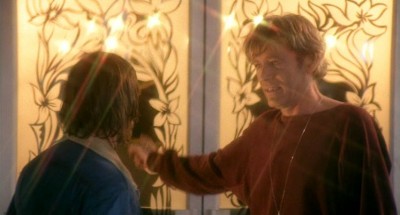
The film’s thematic concerns about the nature of movies and the line between truth and illusion is never far from the surface. Early on, Nina — whom Cameron has just rescued from falling in the ocean — even explains herself with the amazingly resonant line, “I am the movies.” In Eli’s artistic credo — “If God could do the things we can do, he’d be a happy man” — he’s expressing an absolute faith in the power of illusion. And after all, the genius of the movies is that they trick us at every turn — they lie to us to create a truth. They turn a corner in one setting and are seamlessly in a location miles away, creating their own geography. That it feels like an unbroken reality is the magic of it all.
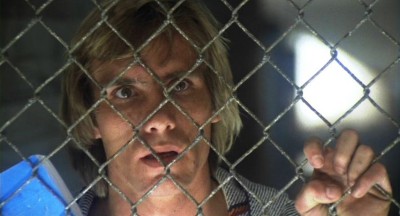
The film that’s being made in The Stunt Man is a perfect example. Typically, for a movie in a movie, it’s something that is as hard to imagine as anything you’d ever really want to see. Its various parts exist only to make points in the narrative of The Stunt Man. Upon examination — if you bother, and there’s no real reason to — the movie that is being made doesn’t even make much sense. And it certainly isn’t presented with any interest in showing how a film is actually made. In fact, it’s often utter nonsense in this regard. What Rush is after is the illusion of how movies are made, not the reality of it. (Just as well because the reality is kind of dull from the outside.)
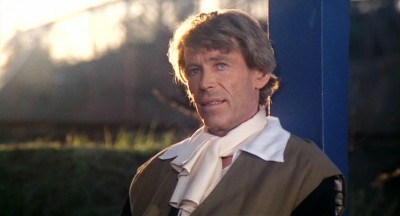
The Stunt Man isn’t quite perfect. Dominic Frontiere’s musical score is a mixed bag. Some of it — especially the “Bits and Pieces” theme (sung by Dusty Springfield) — is sublime. Some of it is serviceable, but some of it is just too jokey. At times, it sounds altogether too much like what you’d expect from a guy who spent a lot of his career writing music for TV shows. But Rush had used him to score his earlier Freebie and the Bean (1974) and would use him to score his next (and seemingly last) film, Color of Night (1994), so apparently he was comfortable with Frontiere’s work. It’s a small price to pay.
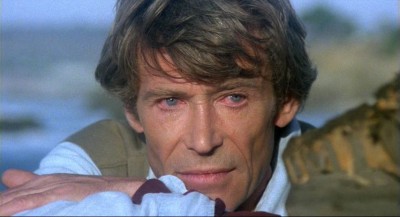
At the top of the film, though, is O’Toole’s richly textured performance as Eli Cross. It is one of the O’Toole performances — of which there are more than a few — where the actor manages to be at once over-the-top and flamboyant, while still being capable of the most amazing moments of quiet intensity. Eli would have been easy to play on one hysterical note, but that’s not what O’Toole gives us. He presents us with all the shadings of the character — his creative enthusiasm, his ego, his sadness and his self-doubt — all packed into one performance. The material is a great help. It’s no wonder O’Toole supposedly told Rush, “If you don’t give me the part, I will kill you” — but it’s O’Toole who brings it to such vibrant life. You don’t see many performances this fine.
The Asheville Film Society will screen The Stunt Man Tuesday, Jan. 7, at 8 p.m. in Theater Six at The Carolina Asheville and will be hosted by Xpress movie critics Ken Hanke and Justin Souther.


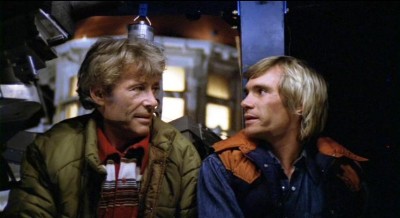


This movie remains one of the most intriguing and engaging films I’ve seen. I also saw it upon initial release, and while I haven’t forgotten the film, I have forgotten the musical score.
Tear yourself away next Tuesday and join us.
That sounds appealing. I did buy the super-duper whiz-bang two-disc DVD years ago, but have never even opened it to re-watch the film. I would prefer to see it on a larger screen than my 42″ Samsung, however, even if I can’t pause it for a bathroom or beverage break.
If you come, note that we’re now in Theater Six and not upstairs in the Cinema Lounge.
Even better.
One of my favorite films ever.
Well, you can come, too.
Even me? Well, is this a great town or what…
Truth is, I’ve seen it so many times I’ll probably pass. But everyone else should see it. Heck, I may come just to see the ending. Railsback is great.
You should. I’d like to see more of you than that eye.
What makes you think there is more?
http://tinyurl.com/p6am939
Well, if that’s true (ahem…) you won’t need to introduce yourself.
I can’t disagree with your picks for best Peter O’Toole performance. I have both of those on vintage laserdiscs, and my wife suggested seeing The Stunt Man again as thoughts turned to O’Toole on his recent death. Amazingly, there was still life left in that 30 year old CBS-FOX pressing! It had been several years since an airing and I echo your sentiments, right down to the often dreadful Frontiere score.
Ah, but bear in mind that there are about 140 cuts made to the laserdisc of The Ruling Class, reducing the film from 154 minutes to 141. The DVD is the only way to travel on that one.